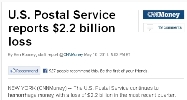 First, the government monopoly:
First, the government monopoly:
CNN Money reports that the “U.S. Postal Service reports $2.2 billion loss” in the first quarter of 2011 and expects to lose lots more.
Second, two private market companies:
 Reuters reports that United Parcel Service’s “profit tops estimates” but, sadly, that FedEx’s profits “fell 3 percent to $231 million.”
Reuters reports that United Parcel Service’s “profit tops estimates” but, sadly, that FedEx’s profits “fell 3 percent to $231 million.”
One question and one comment.
The question: Why does the USPS still have a government monopoly on first class mail and various other subsidies and immunities?
The comment: Much business regulation is driven by fears that free markets lead to monopolies that will gouge consumers. Yet it is very difficult to find actual historical examples of big successful free-market companies that have behaved that way.
So my usual test of the seriousness of those who voice the fear of monopolies is to raise the USPS example — an actual monopoly that has wasted tens of billions of dollars over the decades. Does the afraid-of-monopoly person favor the immediate ending of the USPS?
Surprisingly often, the afraid-of-monopoly people are willing to give the USPS a pass. That response signals to me that they are not really anti-monopoly as much as anti-market. Their fear of possible market monopolies is greater than their fear of actual government monopolies. They worry very much that Intel or Microsoft or the National Football League will start gouging consumers, so they support vigilant antitrust monitoring and prosecution of those companies. But they feel little concern about the USPS and various monopoly public utilities and are content to let them be.
In my judgment, we shouldn’t be worrying about companies in a free market that have earned a large market share — their earned market share means they are doing something we consumers like and, consequently, we are voluntarily rewarding them for it. We should be worrying about companies and entities that get their position through government favoritism — their market position is based on special privileges and coercion, and, not coincidentally, as the USPS example shows, they are typically inefficient.
” Yet it is very difficult to find actual historical examples of big successful free-market companies that have behaved that way “………we are just sitting in the pity of free market madness has created, the failure of the markets, the sub prime market sales other than the failure of the free market to behave a resonable way.There will always be some ass who thinks he has to have his 30 pieces of silver, and the rest can go to hell in a handcart.
The larger a company grows the more ability it has to misuse it’s power, and in general if a company runs for profit it is more likely to run it for that purpose alown, to the depracation of it’s suppliers, employees & if there a real bunch of ‘grab it now boys’, customers. The US postal market that has been cut up, ie private parcel services, that could be used to cross subdise the other elements of the postal system, and reduce that $ 2.2 billion figure. If you want a unified nation, some things need to be in the public sector, to give a good standard & give a reason to stand around the flag in the morning.
Hi Robert:
The last two decades’ economy has been strongly politicized, especially the financial sector and the mortgage markets, so I have no idea why you that those have been free markets.
But that is beside the point of this post, which is about government monopolies and private enterprise. Can you give any specific examples of successful big companies that earned a large market share and then proceeded to gouge their customers? That would be relevant data.
Hi Stephen
According to a 2008 report by the USPS entitled, “Report on Universal Postal Service and the Postal Monopoly.”, alternatives to the USPS exist for every piece of mail that it delivers. These alternatives include private companies such as UPS and FedEx, as well as the Internet (page 2 of the report). (The report cites the Internet as a primary reason for declining USPS volume). In other words, the exchange of ideas and information can and does occur without the involvement of the USPS—the nation is “bound” together.
The report also acknowledges that differential pricing—pricing based on distance and location—is common among private companies and makes economic sense. Such pricing recognizes the fact that low volume routes and remote locations incur more costs to deliver mail, and the users of the service should bear the costs but the USPS rejects differential pricing precisely because of this:
“This would put service in danger for areas of the country whose volumes do not justify the costs to serve, namely isolated rural areas and low income urban areas. This is precisely the portion of the America public who could least afford an increase in postal pricing or a decrease in service. Isolated regions of the country currently depend heavily on the Postal Service to transport prescription medicines, educational materials, and other supplies. Cutting off such areas from uniform, affordable service and access could be devastating for these Americans. (page 81 of the report)”
In other words, because of where they choose to live, some Americans need the USO in order to afford regular mail delivery. This is the “justification” for the USO. The report goes on to acknowledge the existential results: The criminalization of certain economic activities (such as the private delivery of first-class mail), higher costs to other postal customers, and political pressure to keep financially unviable post offices open.
Lets also not forget that prior to the Civil War much of the nation’s mail was delivered by private express companies. These companies offered their services at a substantially lower price than the postal service and consumers voluntarily used the private companies. The owners of the private expresses were acting in their own self-interest—their desire to make a profit. The customers of these companies were similarly acting in their own self-interest—their desire to save money. Neither was taken advantage of or forced to engage in the transaction. Neither acted for the benefit of the other as his motivation, yet each party did in fact benefit because each was left free to act according to his own judgment.
Simply put there is no rational justification for the existence of the USPS
Can’t there be side benefits when public institutions run at a loss?
Aren’t there some economic benefits from their counter cyclical properties?
Monopolies are unnatural and require “Power of State” in order to exist. “Power of State” is mostly provided by regulation in the modern context.
I have a background in freshwater ecology, though I am a Software Engineer by trade. If a “weedy” species is found in an extreme abundance in a particular area, generally that area has been disturbed, e.g via damming or channeling. Given time, the dominance of the weedy species will abate and a new balance will be achieved.
When a company is enjoying market dominance that approaches being a monopoly, I usually suspect some governmental intervention.
As far as modern Monopolies, Microsoft comes awful close. They have dominated the market with overprice inferior products. Their software is not more “usable” for technological reasons, but because of licensing. This works mostly because software is a “Network good”. But even then, Microsoft succumbs to market pressures.
Im obliged for the post.Thanks Again. Keep writing.
Just to let you know your web-site appears a little bit unusual in Firefox on my pc using Linux .